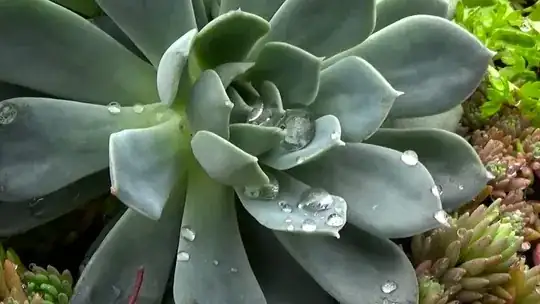There is too little water to attract mosquitoes to lay their eggs. You do need to worry about a kitty bowl full of water in the shade yet able to fill when it rains. But not the droplets on succulents. Leaving anything out of doors that can collect water and last for longer than a week is mosquito hatching water.
Where is it that you live? We've got friends in Alaska that can tell you what lots of mosquitoes are like. Just moist bogs, soils, rivers...and they have to fight clouds of biting mosquitoes. They have to have mosquito netting when out of doors or allow the mosquitoes to bite them a lot...when mosquitoes bite they give off pheromones that tell other mosquitoes to back off. Weird, huh.
edit: I will submit that mosquitoes will lay eggs in any water. A teaspoon of water? Those eggs will not come to fruition. No problem. That water has to be able to stand at least one week to become a mosquito breeding problem. A few drops of chlorine? Such as water troughs for horses and cattle? Droplets on a succulent? Not happening. Yes, the eggs last for awhile but to ever become a problem those eggs need to be IN water water or moist bog soils at least a week. Just keeping little pet bowls, old sinks, any kind of water collecting container dumped out is pretty much all that is necessary. Imagine living in Alaska, lots of swamp/bogs/rivers/lakes...tons of mosquitoes that most people in the continental U.S. have no idea of the swarms!
I'd be worrying far more about what is in that water than mosquitoes. If it is from a well outside the influence of Aluminum ad Phosphate companies, then great. If it is tap water, highly infused with fluoride? That is a huge worry and needs investigation. Chlorine dissipates. Not a big deal...but fluoride?
Healthy people, healthy animals are able to deal with these diseases. The immune system of animals is powerful. When the animal (human) has a depressed immune system that is when problems arise. That is when cancer becomes a problem. Our immune systems are very amazing.
